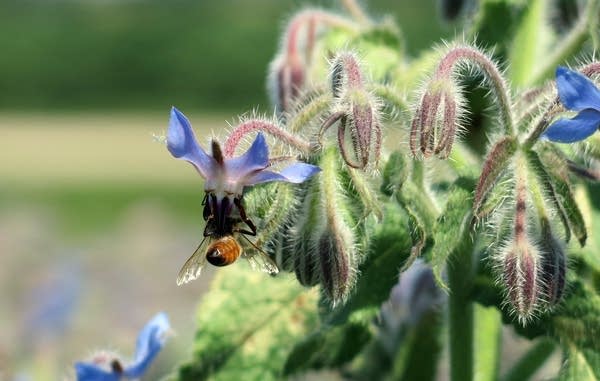Pollinator protections facing obstacles at Capitol

Go Deeper.
Create an account or log in to save stories.
Like this?
Thanks for liking this story! We have added it to a list of your favorite stories.
An effort by the Dayton administration to protect pollinators is running into opposition at the Legislature and key provisions appear to be dead for the session.
Republican lawmakers leading the fight say they're protecting agriculture from harmful pesticide regulation.
Last year the governor and state Department of Agriculture officials proposed a pollinator protection initiative they said would make Minnesota a national leader in protecting bees and butterflies.
A centerpiece of the initiative was more research and regulation of class of widely used insecticides called neonicotinoids.
Turn Up Your Support
MPR News helps you turn down the noise and build shared understanding. Turn up your support for this public resource and keep trusted journalism accessible to all.
One of the most common ways the insecticides are used is as a seed coating. The seed is protected from insects in the ground, and as the plant grows it takes up the insecticide along with water and nutrients. So the insecticide is in the plant, making it very effective at killing pests that eat plants.
But research shows neonicotinoids used in this way can also harm beneficial insects like bees. When the seeds are planted, dust carries the insecticide on the wind. The dust can contaminate bee colonies nearby, and the insecticide spread by wind and water can contaminate flowering plants near the fields.
So, as part of last year's initiative, the ag department recommended that the Legislature grant it authority to regulate treated seed as a pesticide.
"We already have huge losses," says Susan Stokes, an assistant commissioner in the department. "We can't just keep doing what we're doing because if we do that we will lose many of our pollinators."
But committees in the Republican-controlled House and Senate rejected the idea of regulating treated seeds.
"(We're) just concerned about the increased regulation on farming and a farming practice," said Rep. Anderson. "I don't think the science has proved the dire consequences of planting corn treated with this chemical."
Disagreement over research also plays a role in opposition to a second Dayton pollinator initiative — creation of a pollinator account funded by pesticide fees to pay for research and education about neonicotinoid use.
The Department of Agriculture wanted to gather data that would help establish best management practices for farmers who use the insecticide and reduce exposure to pollinators.
The Senate eliminated that funding this session. The House changed the fund to focus on pollinator habitat research.
Anderson argues a lack of habitat is the biggest problem for bees, yet he says neonicotinoids seem to get the blame.
"(We) don't really have the science yet to back up that, yes, this is the leading cause and we've got to ... restrict the use of them," said Anderson.
So, where is the science? There are competing studies, but a couple of years ago an international panel of scientists analyzed more than 1,000 peer reviewed studies. They found bees are highly vulnerable to neonicotinoids and are harmed by contaminated pollen, nectar and water.
Stokes says there's much more to learn about how to protect bees.
"I would like to see us continue to lead with the science," said Stokes. "But we're at a stop sign here. We just can't go any further until the Legislature works with us to make some progress on the issue."
Another provision added in the Senate could go a step farther and roll back pesticide regulation in Minnesota.
The legislation would restrict the department's pesticide enforcement authority. Stokes says it would likely limit oversight of all pesticides, not just neonicotinoids. She says the language is so broad it would almost certainly need to be interpreted by a court. The Senate agriculture committee chairs did not respond to interview requests.
Rep. Anderson said he hasn't heard much from his west central Minnesota constituents about pollinator protection, just a few emails.
Rep. Rick Hansen, DFL-South St. Paul, says his email box is stuffed with notes from people concerned about bees and butterflies.
"And that isn't some wacky environmental thing, that's a mainstream Minnesota opinion," said Hansen, who who sits on the Ag Finance committee. "I think it's an overreach by the Republican majority and I am hopeful that Minnesotans are going to react by asking their legislators 'what on earth are you doing.'"
Some supporters of the pollinator initiative are already looking ahead to next year thinking about how to gain more support for the legislation.


